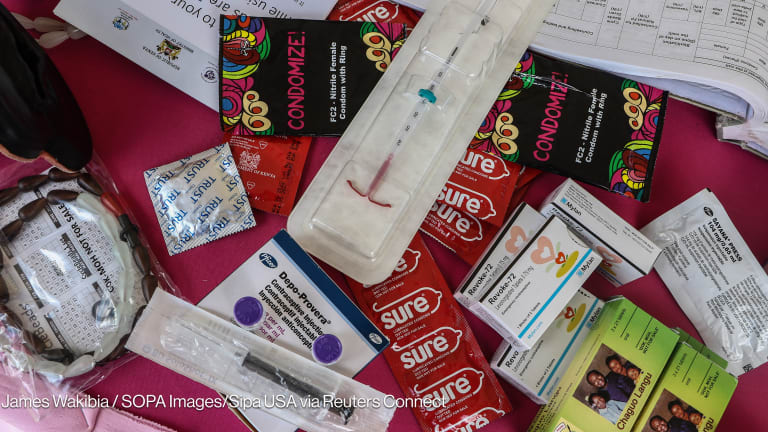
Cuts to the U.K. aid budget could mean 7.5 million additional unintended pregnancies, 2.7 million unsafe abortions, and 22,000 maternal deaths worldwide over the next year, according to Dr. Alvaro Bermejo, director general of the International Planned Parenthood Federation.
In a scathing interview with Devex, Bermejo criticized the United Kingdom government for pursuing a “narrative that does not have much correlation with reality,” and accused Britain of “lying” to the current U.S. government about the U.K.’s commitment to girls’ rights.
The U.K. government’s decision is a “betrayal” of the women using IPPF services, Bermejo said.
“Cuts to family planning programmes will mean that the contraception that women have relied on ... will be taken away.”
— Baroness Elizabeth Sugg, former FCDO ministerHe said they will “turn up to have their next doses of contraceptives, the next injection, or the next implant, or [to get] the implant or IUD … removed, and the clinic will be closed because there’s no provider … Recovering that trust of that woman is nearly impossible.”
The U.K. government announced in Nov. 2020 it would not be meeting its commitment to spending 0.7% of gross national income on aid, causing a £4.5 billion ($6 billion) funding gap in the sector. Decisions around how the aid budget is changing have since been shrouded in mystery, with many NGOs complaining about a lack of government transparency.
The U.K.’s “flagship program” on sexual and reproductive health, the aid-funded Women’s Integrated Sexual Health — of which IPPF is a major implementor — has been “incredibly successful and prevented an estimated 11.7 million unintended pregnancies, 4.3 million unsafe abortions, 34,000 maternal deaths,” since its inception in 2018, according to Bermejo.
The cuts highlight the vast shift in U.K. government policy over the past year: In June 2020, the U.K. government told IPPF the £140-million program was “incredibly successful” and asked them to present a proposal for the next two years, Bermejo said.
But Foreign, Commonwealth & Development Office officials have since told IPPF “there is no money available to fund” the program, he said. Having successfully adapted its program to the COVID-19 pandemic, IPPF was subsequently advised by FCDO officials to reduce existing funding as much as possible and try to “stretch it” beyond June 2021, according to Bermejo.
More on the UK aid cuts
►UK's aid budget to Yemen slashed by nearly 60%
►Tony Blair: UK aid cuts and DFID closure a 'long-term strategic mistake'
What that “stretch” means in practice is the closure of Women’s Integrated Sexual Health programs in eight countries including Afghanistan, Pakistan, Bangladesh, and Ethiopia. In the six countries expected to remain open, programs will operate at 30% of the previous capacity. Bermejo questioned the U.K.’s commitment to girls’ education, given that lack of access to family planning assistance can mean girls are forced to leave school for unintended pregnancies or abandon educational goals when overwhelmed by early motherhood.
IPPF will also have to make “a lot” of staff cuts, mostly front-line health care providers, he said, adding that he expected the organization to continue running but “it will be a very different proposition.”
In a statement, a U.K. government spokesperson defended the aid cuts as “tough but necessary decisions” but did not deny the scale of cuts to sexual and reproductive health. “We are still working through what this means for individual programmes and decisions have not yet been made,” the statement said.
The U.K. has long been considered a global aid leader and one of the biggest donors to sexual and reproductive health. This has often been in stark contrast to the U.S., which until January followed the Mexico City Policy, also known as “the global gag rule,” withholding U.S. health aid from international groups that offer information about abortion.
While the U.K. government, Bermejo said, criticized the global gag rule’s use under former U.S. President Donald Trump, “[the U.K.] continues to pledge its support for sexual and reproductive health and rights, and then cuts the two major providers of sexual and reproductive health in the world, IPPF and MSI [Marie Stopes International].”
MSI works on the WISH program with IPPF. The organization did not respond to Devex by the time of publication.
He added: “In our case, it doesn’t just cut us; it reduces us to zero funding for the next year.”
The U.K.’s decision was criticized by Baroness Elizabeth Sugg, the former FCDO minister who resigned in protest over the cut to the 0.7% aid target.
“Cuts to family planning programmes will mean that the contraception that women have relied on to allow them to have control of their lives and the size of their families will be taken away from them,” she wrote to Devex.
Sugg added: “Women and girls will no longer be able to get the information or contraception that we all take for granted, and their lives will be changed forever as a result. We must keep our promise to women and girls, and keep funding life saving sexual and reproductive health services.”
Improving girls’ education globally is a G-7 priority for the U.K. government. But Bermejo said achieving this would be “impossible unless you also invest in giving them [girls] control over their own bodies, if they cannot no control their own bodies they cannot control their attendance to school, they cannot control their future and their lives.”








